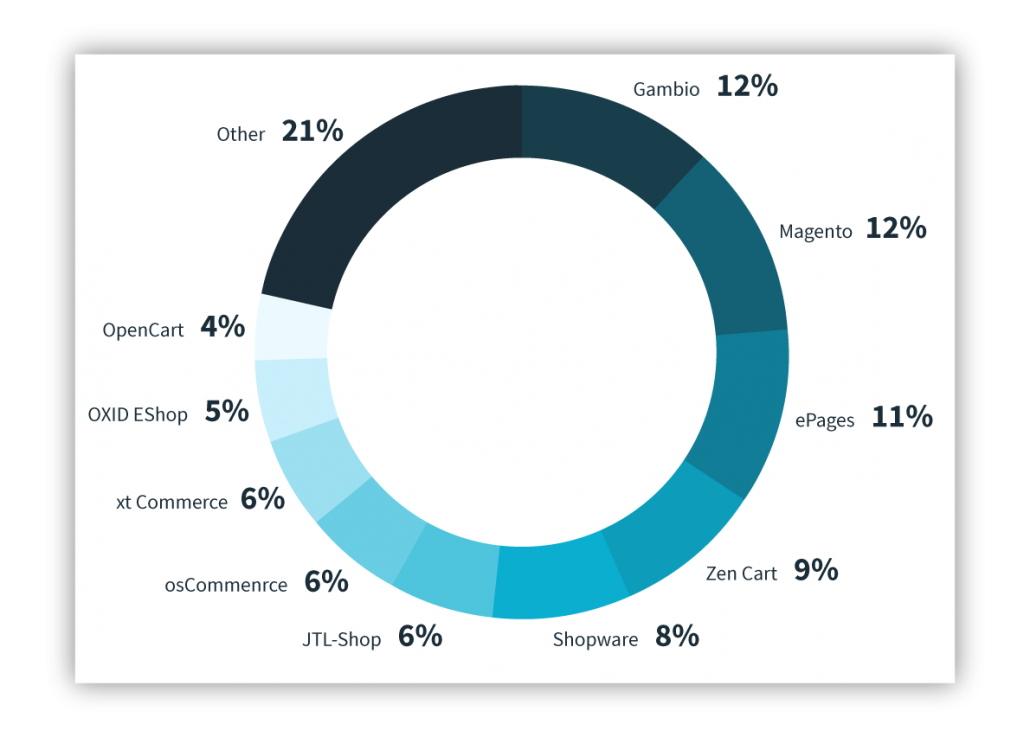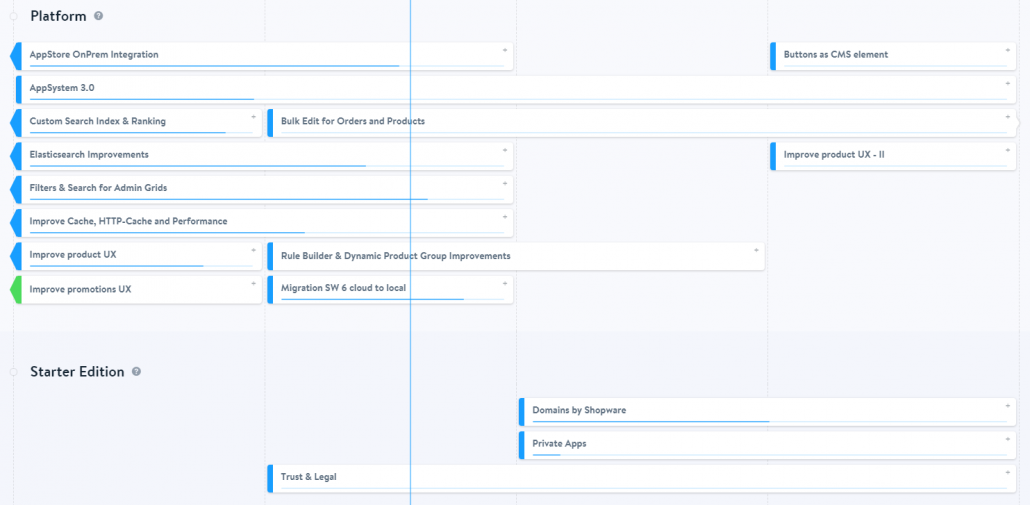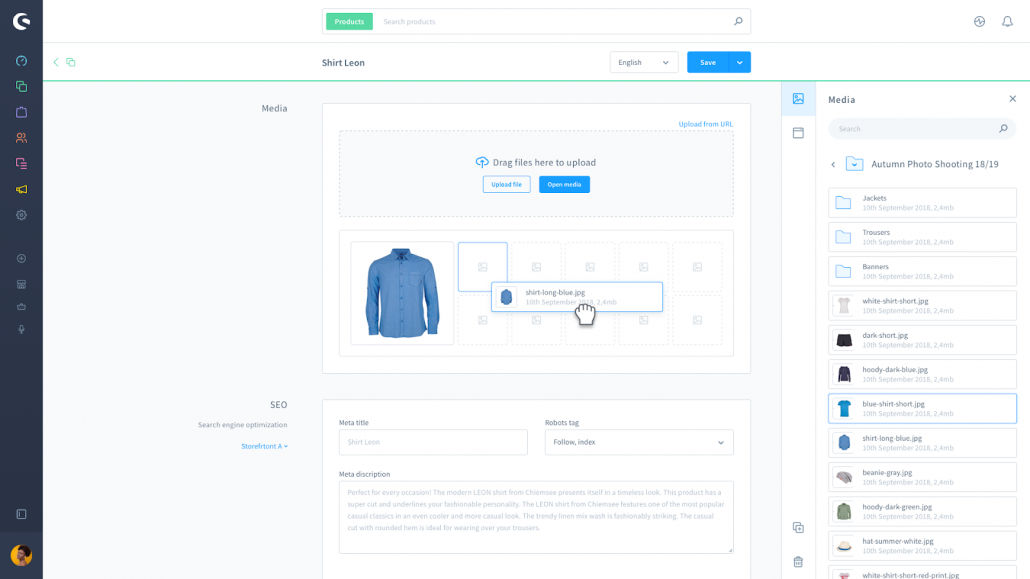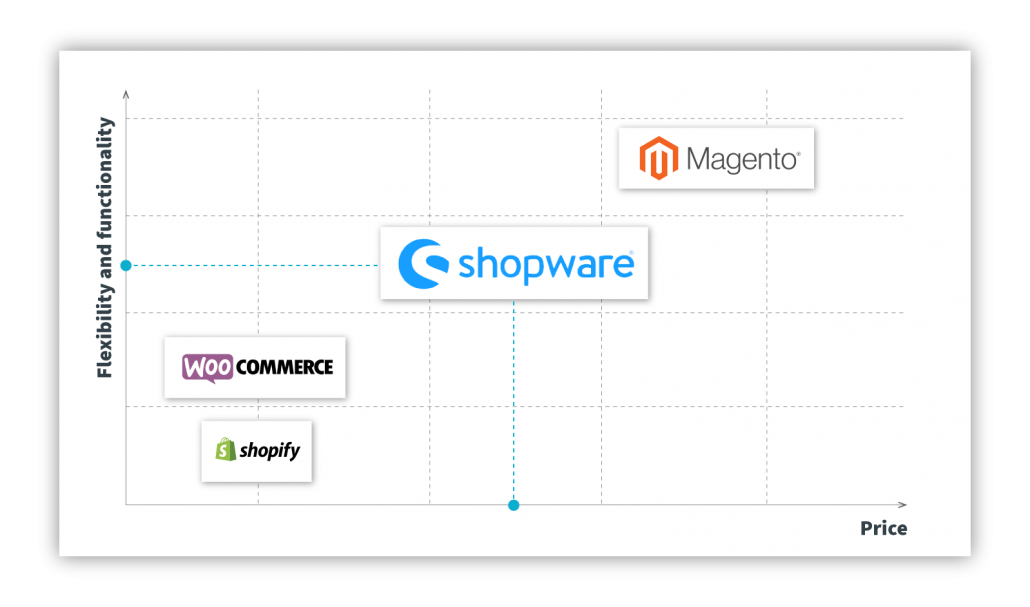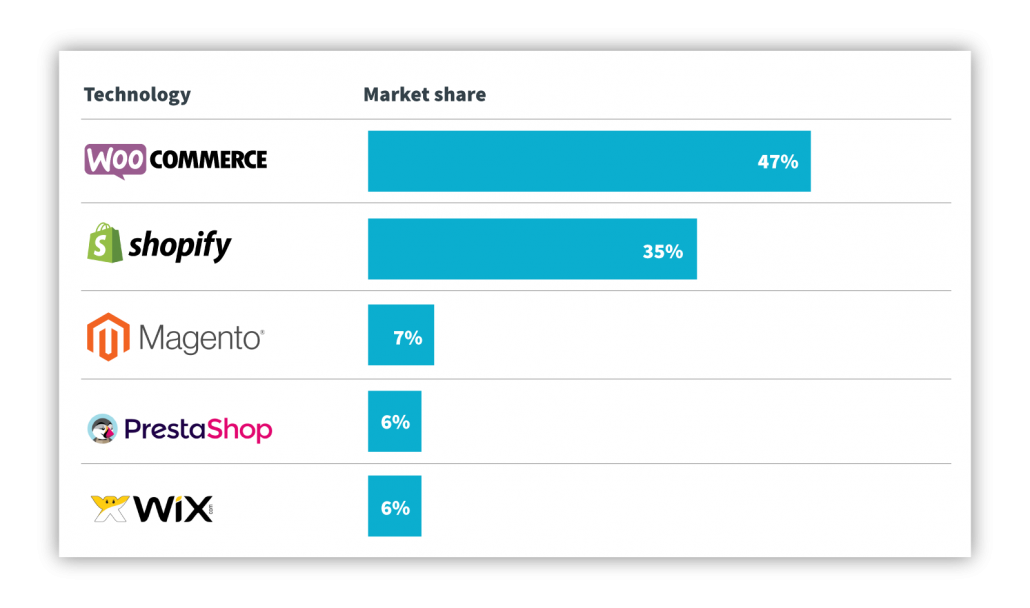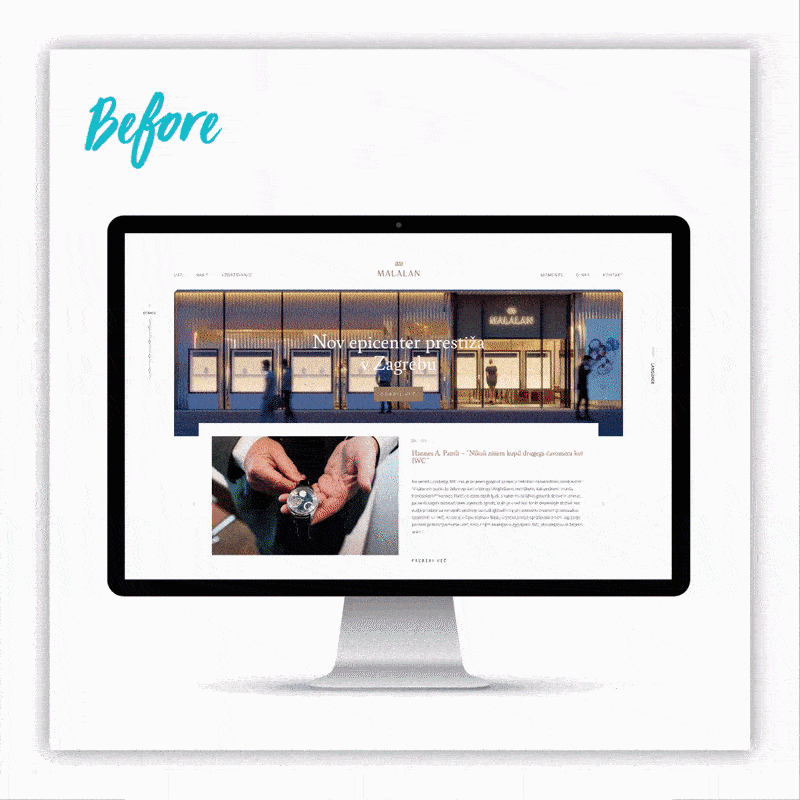After months of testing, learning and the brave first steps, we are happy to report that we’ve got the one … Yes, we’ve found the perfect eCommerce solution to fill the gap in our service portfolio, enabling us to offer our clients – regardless of their size, technical demands or financial constraints – a flexible, reliable and modern platform that meets all the demands of today’s online sellers, even those on a tighter budget. While Shopware might not yet be a widely recognised name in the eCommerce world, its future surely looks bright. Read more about our impressions with it and find out why we’re so sure of this!
What is Shopware?
Shopware is an open-source eCommerce platform, which was created by the German Company Shopware AG. It’s a modern, user-friendly, and, most importantly, high-quality solution for a wide range of eCommerce needs. Throughout two decades of continuous development, it’s been steadily gaining recognition and is currently considered as one of the most promising offers in the field. Shopware’s popularity is the highest in German-speaking countries, where it holds an 8% market share, already running around 100.000 online shops. According to Google Trends data, the search term Shopware is more popular in Germany than the Keyword used to look up one of its strongest competitors: Magento. This makes clear that Shopware is the fastest growing eCommerce solution in the DACH region.
What is more, the Germans released a completely revamped version of the platform at the end of 2019, calling it Shopware 6. This edition features a completely new architecture and a rewritten code, allowing for an even faster development of new features and making even greater leaps on the global eCommerce market.
But What Made our eCommerce Team Look for Another Solution?
Tackling all kinds of eCommerce challenges, our team had detected a growing need for an additional solution that would cater to online sellers needing a fast, simple but also reliable eCommerce solution that doesn’t require a high initial investment while presenting no obstacle for future upgrades and extensions.
The reason for such thinking lies in the fact that Magento-based web shops are too expensive for many a company while cheaper alternatives, such as the combination of WordPress and the WooCommerce plugin or Shopify, don’t offer adequate performance or enough flexibility.
We therefore needed to adopt a new eCommerce platform that we could use instead of Magento to build smaller web shops, thus expediting and simplifying the development process while also bringing the total cost down.
Among our top candidates were PrestaShop, CoreShop, Sylius and Shopware. After carefully comparing their functionalities and the technologies they are based on, the winner was chosen pretty much unanimously: Shopware convinced us with its cutting-edge technical underpinnings, a great many positive reviews within the eCommerce community as well as the policy of its founders, who continuously invest in the platform’s development and are transparent in regard to future upgrades.
Why is Shopware Such an Awesome Choice?
A Future-proof Solution
Shopware is based on the most advanced technologies, which not only makes it incredibly flexible and easy to work with, but also turns it into a future-proof eCommerce option. What is more, one of the biggest advantages is this platform is arguably the transparency of its creators, who provide the users with a complete overview of the software development process. With a clear roadmap, every developer knows what upgrades the Shopware team are working on, what challenges they aim to tackle in the future and what their long-term vision is.
For the Biggest Players and the Underdogs Alike (and Everyone in Between)
Available in three editions, Shopware caters to a wide range of users, regardless of their budget or technical demands.
- The Starter edition is free of charge and therefore a great choice for businesses setting-up their first web shop. With its help, eCommerce newcomers can expedite the launch of their web store while also investing less money than in the case of the competing solutions. At the same time, it enables existing online sellers with stores on other platforms an easy and painless migration to the Shopware ecosistem.
- Companies aiming to scale their eCommerce efforts and expand to foreign markets will benefit from Shopware Professional. Its key advantages include direct manufacturer support, customizable products as well as extensive sales channels (i.e. social networks) and a range of CMS functions aimed at improving the user experience and further boosting conversions.
- Shopware also has a top-of-the-range solution for the largest companies: the Enterprise edition, which is the ideal choice for established online sellers present in the B2C as well as in the B2B segment. To make online business with other companies easier, this solution includes a special B2B suite that enables different roles and access levels for users, access to client accounts, a faster ordering process for business clients and individually tailored quotes.
It Grows Together with the Business #scalability
One of the key advantages of Shopware’s eCommerce solution over its rivals is the scalability of the entire ecosystem. True to their ingenuity, the Germans have come up with a simple, yet innovative business model in favour of those businesses that want to build their online presence gradually. Enabling easy upgrades to more advanced editions, Shopware enables companies to start small and with a low budget while adding functionalities according to their growing business needs.
Making Users Happy With a Modern Technology Stack and Tons of Power …
Powered by technologies such as Symfony and Vue.js, Shopware is attractive to a growing community of developers, which means more support channels, quicker bug fixes and easier integration with fresh digital solutions and other services. A strong foundation is also at the heart of Shopware’s stellar performance, making it more powerful than most solutions with the same extent of functionalities.
… as well as with an Intuitive UI!
The list of Shopware’s main strengths wouldn’t be complete without mentioning its minimalistic and incredibly intuitive user interface, which does not require users with a specialist skill set or advanced training. Employees tasked with entering or editing data can therefore work faster and more efficiently, investing the time they’ve saved in other crucial activities, such as content optimisation.
And how does Shopware Compare to Other Solutions?
Shopware vs. Shopify
Shopify is a quick and easy solution for building, editing and promoting web shops. It’s a relatively simple eCommerce platform that offers everything a (small-sized) online seller needs to enter the market with little fuss. However, the simplicity that makes for an easy start can later turn into an obstacle, especially when adding new functionalities and developing the site further. To use this platform, a monthly fee is also required.
In contrast, Shopware offers enough simplicity for a fuss-free development process without sacrificing flexibility and scalability, which are of key importance for later growth. While it takes a bit more time to set things up at the beginning than Shopify, Shopware more than makes up for this with its open-source nature as it (in its basic version) requires no additional costs or commissions.
Shopware vs. WooCommerce
WooCommerce is a WordPress plugin enabling businesses to quickly and easily enrich their sites with basic eCommerce functionality. Its main trump cards are a dead-easy UI and an almost endless number of expansions, which more than explains why this is one of the most popular solutions in the eCommerce universe right now. However, even such a great choice doesn’t come without obvious caveats.
Especially WooCommerce-based web shops with a larger product portfolio or advanced functionalities are prone to underperforming, which can seriously affect one’s online business. Therefore, this solution is best for small-scale online shops while businesses with scalability and flexibility in mind might want to look for alternative ecosystems.
And one of the best alternatives out there is Shopware, which poses no risk that an eCommerce site would get bogged down due to too many products. Therefore, it’s a perfect solution for larger or fast-growing businesses that don’t want to take any chances when it comes to the performance of their online stores. What is more, those in charge of editing the content are oftentimes surprised to discover that Shopware’s UI is at least as intuitive as that of WordPress.
Shopware vs. Magento
Magento is a well-known and widely used eCommerce solution that easily meets the needs of the most demanding online sellers. This is a robust but flexible platform that can easily handle all kinds of challenges, but such performance doesn’t come cheap. Developing, maintaining and hosting a Magento store requires a much higher investment than opting for competing solutions.
And if there’s one that can give Magento a run for its money, both in terms of performance and scalability, it’s Shopware, which utilises its cutting-edge tech to meet the requirements of even the most demanding online sellers. At the same the German platform is substantially cheaper than its popular rival while also being more developer-friendly and easier to maintain.
Taking into account its structure and the level of complexity, Shopware shares many similarities with Magento 1, which is still very popular among developers and end-users alike. However, despite its status, Magento inc. decided to drop the support for this edition and focus solely on the development of its successor, Magento 2. This move has seen the company lose a large part of their loyal community as many disappointed developers have transitioned over to Shopware. Among them is also Vinai Kopp, one of the key personalities in the Magento communities. Similarly to many others in this field, he’s made the switch as he believes that Shopware has a bright future ahead. However, many of his colleagues also cite another reason for their transition, namely the fact that Magento’s source code has four times as many active errors than that of Shopware.
Limitations of Shopware
Shopware AG has been investing in its platform since its beginnings in 2000, which means more than 2 decades of development. However, the newest version of the platform, Shopware 6, has only been on the market a little over a year, which makes some limitations inevitable.
New Kid on the Block
The main disadvantage of Shopware is a relatively small market share as the platform still records fewer downloads as its rival solutions and has a smaller developer community. However, Shopware 6 is making rapid progress and is regularly upgraded, which might negatively affect some sites. The reason: many third-party or custom plugins might, for example, cause a site to malfunction after an substantial upgrade.
Adding new Functionalities Comes at a Price
When planning on adding new features to the existing eCommerce site, it’s a really good idea to at least roughly evaluate the development as well as maintenance costs. It’s true that the basic edition is practically free of charge, but if one uses the Professional or the Enterprise edition along with a few plugins, the licensing costs for the complete solution can range between a few thousand and a few tens of thousands of dollars.
Limitations Outside the EU
The fact that Shopware is a European product can be both a blessing and a curse. Web shops only gunning for buyers in the EU pose no problems in terms of configuration, but things can get a little complicated if a company also wants to be present in non-EU markets. In such cases, shipping, payment and tax settings might be a bit trickier to properly configure.
Working with Shopware: our Take
Our team has already had the chance to put the new platform through its paces, using Shopware to build two modern eCommerce sites. One of them is the new site of a renowned Slovenian watch retailer Malalan. The web shop just needs a few finishing touches and we can’t wait for it to welcome its first online visitors! To find out how everyone involved felt about working with the new platform, we asked both the client and our eCommerce specialists about their experiences throughout the process.
What our Clients think about Shopware
“We first found out about Shopware when we started looking for ways of upgrading our site, which is based on the combination of WordPress and WooCommerce. Based on the state of this site, we identified the main areas for improvement:
- loading speed and general performance;
- ability to manage up to 10,000 products and prepare content in multiple languages;
- ability to tailor page elements to our marketing activities/needs.
We presented our objectives to several digital agencies, of which Optiweb was the only one to come up with an alternative solution. At first thought, we found their proposition quite appealing, even if Optiweb’s team themselves had not yet tested the solution they suggested. Therefore, the process served both us as clients and the developers to get to know the platform. We’ve suffered a few setbacks along the way but we’ve successfully overcome all obstacles. I am proud to say that at the moment of writing, the project is close to the finish line.
The process has made it clear to us that Shopware’s engineers have really thought their solution through and have a clear idea about where they want to take it next. Editing content in several languages and managing products are a piece of cake, the purchase process is clearly defined and the system as a whole is capable enough out of the box.
There is also a rich offer of free and paid plugins while Shopware even allows for easy integration with other services. Despite the fact that other solutions still offer more flexibility in this field, Shopware meets all our current needs. Of course, Optiweb has also developed some custom plugins for our specific needs.
After the first few months of working on the revamped site, I can honestly say that Shopware’s eCommerce solution doesn’t just offer easier product management, but is also more pleasant to work with than the WordPress & WooCommerce combination. I had expected its UI to be a bit more cumbersome than that of WordPress but found it pretty solid. I also expect that future upgrades will make it even better.”
Nejc Puš – Marketing Manager – Malalan d.o.o.
What our Developers Think About Shopware
For us as developers, Shopware represents an incredibly practical as well as a reliable choice. We can use it instead of WooCommerce when building less complex sites while it also serves us well for the type of projects that used to require the more complex Magento 2. In the latter case, we would sometimes need more than half a year to finish the web shop, but with Shopware, we need a lot less time while still not worrying about the end product performing too slowly.
The new platform also presents a significant advantage when it comes to expanding our team, especially as it requires much less time for a developer to get properly settled in than Magento. Moreover, as we see the German eCommerce solution quickly gain popularity among developers, we find its adoption even more important as we want to offer our current and future members the tools and technologies they like to work with.
Hungry for New Knowledge, Awesome Teammates and Big Projects?
At Optiweb, we take the old saying “the more the merrier” very seriously. Besides regularly expanding all our departments, we’ve managed to build the biggest Magento team in Slovenia. Therefore, it only makes sense that we also aim to build the biggest Shopware crew in our country and beyond. And to make this happen, we also count on your help!
Are you a passionate developer whose heart skips a beat when there’s talk about eCommerce? If your idea of expanding knowledge includes working with the most advanced technologies and gaining skills on big and exciting projects, it’s high time that we meet! What’s more, awesome mentors and unlimited amounts of coffee come as standard, so don’t hesitate to give our list of open positions a thorough look! ;)

